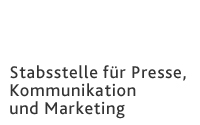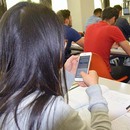Executive Department for
Press, Communication and Marketing
Adolf-Reichwein-Straße 2a Gebäude AVZ (Gebäudeteil AR-NA) 57068 Siegen
Phone: +49 (0)271/740-4915 Fax.: +49 (0)271/740-4911 E-Mail: presse@uni-siegen.de
Open, Clever, Flexible
Scientists from the University of Siegen have developed a learning platform for foreign languages with European partners. COMALAT is accessible free of charge and adapts individually to the learner's strengths and weaknesses.
A German course for refugees at the University of Siegen. Course leader Christian Gerhus is standing at the blackboard, in front of him sit twenty young people who are typing on their smart phones. Whereas this is usually a cause for vexation to teachers in most university seminars, here it is expressly desired. The participants have downloaded the app "COMALAT" - a language learning system developed by scientists from the University of Siegen together with colleagues from Greece and Spain. Language and integration courses for refugees or labor migrants are possible applications for COMALAT.
The software adapts to individual learning behavior
"COMALAT is an open learning platform. Teachers can upload practice material and then use it in their classroom, "explains Prof. Dr. Udo Kelter, one of the project managers at the University of Siegen. Above all, COMALAT offers the possibility to acquire independent linguistic competence. To this end, language teachers have each developed a beginner- and an advanced course in German, English and Spanish. The special feature is that the software is programmed in such a way, that it "learns" from the interaction with the users and adjusts itself independently to the respective learning behavior. "Statistical methods are used to examine the strengths and weaknesses of users. At the end of each unit, they receive individual feedback. For example, if necessary, the system recommends appropriate additional tasks, "explains Prof. Dr. Madjid Fathi, under whose direction the technical implementation of COMALAT was realized.
The necessary programming of the software was the biggest challenge in the project, says project manager Johannes Zenkert. "Assessing the learning progress and finding corrective measures - these are actually the original tasks of a teacher. At COMALAT, this is imitated by the software. "At the University of Siegen, the Department of Practical Computer Science (PI) and the Institute of Knowledge Based Systems and Knowledge Management (WBS) were involved in the development. The Siegen researchers were supported by computer scientists from Aristotle University in Thessaloniki. The development of the teaching materials was taken over by experts from the Language Center at the University of Alicante in Spain.
Language proficiency for the working environment
Mainly, the so-called passive linguistic competence, including vocabulary, reading, and listening comprehension can be trained with COMALAT. In the beginners' courses, first basics are taught. The sequential modules also contain special vocabulary from occupational fields such as "medicine", "tourism" or "science and technology". "When we started with the project, we particularly had migrant workers from Southern Europe in mind as a target group. That is, young people from Spain or Italy who come to Germany in search of a job or training place and have to learn German quickly, "says Kelter. In recent months, refugees have been added as potential users. In order to make the program available to them, controls and explanatory texts were also translated into Arabic by the staff of the project "Refugees Help Refugees" of the University of Siegen. "We are very grateful that we were able to try out COMALAT in German courses for refugees," emphasizes Johannes Zenkert. "The collaboration with Christian Gerhus has provided us with valuable information that has helped us further improve the platform."
COMALAT is a so-called "Open Educational Resource", open to all interested parties and free of charge. The platform can be found on the Internet at www.comalat.eu. The learning materials can also be studied offline via a smart phone app. In the future, municipalities could also use COMALAT to help people with an immigration background participate in public life. Corresponding cooperation is already under consideration.
Background:
COMALAT stands for "Competence Oriented Multilingual Adaptive Language Assessment and Training System". The joint project under the auspices of the University of Siegen was funded by the EU within the framework of the "Erasmus +" program with € 445,000. It started in September 2014 and expires in August 2017. The project involves the Department of Practical Computer Science (PI) and the Institute of Knowledge Based Systems and Knowledge Management (WBS) at the University of Siegen, as well as the Aristoteles University of Thessaloniki in Greece and the Language Center of the University of Alicante in Spain.
Contact at the University of Siegen:
Prof. Dr. Udo Kelter (project manager), Tel .: +49-271-740-2611, e-mail: kelter@informatik.uni-siegen.de
Johannes Zenkert (Project Manager), Tel .: +49-271-740-2142, e-mail: johannes.zenkert@uni-siegen.de


